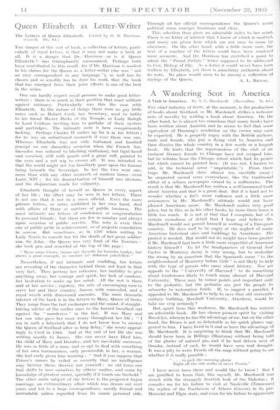Queen Elizabeth as Letter-Writer
The Letters of Queen Elizabeth. Edited by G. 13. Harrison. {Cassell. lei 6d.) THE danger of this sort of book, a collection of letters, parti- cularly of royal letters, is that it may not in.ake a book at all. It is a danger that Dr.- Harrison--or is it Queen Elizabeth ?---has triumphantly surmounted. Perhaps both haze contributed to this result, for if Dr. Harrison is modest ill his clanks for the -Queen. as a letter-writer (she was " not an easy correspondent in any language "), so well has he chosen andso• sensibly has lie done his work, that the book that has emerged from their joint efforts is one of the best in the series.
One can hardly expect royal persons to. make good letter- writers : there is so ninth in their position that must militate against intimacy. Particularly was this the case with Elizabeth. In the nature of things there were no gay little notes such as Robert Cecil, her Secretary, used to indite to his friend Master Hicks of the Temple, or Lady Ralegh to Lord Cobham inviting hirer to partake of their oysters and partridges. The intimate note is here conspicuously lacking. Perhaps Charles II makes up for it in his letters for he was an unbuttoned monarch if ever there was one. Whereas Elizabeth was not only buttoned and knotted (except on one shameless occasion when the French Am- bassador was reduced to blushing confusion), but tight-laced and corseted, Stiff with pearls and a great ruff, painted to
• the eyes and a red wig to crown all. 'It was intended so that the world might not too familiarly gaze upon the human being beneath the Sovereign. In her the two were one, more than with any other monarch of modern times even Louis XIV ; for his dramatisation of himself was obVious,- and the disjunction made for vulgarity. •
Elizabeth thought of 'herself as Queen in every aspect of her life ; the effect may be seen in her letters. There is not one that is not in a sense official. Ever the more private letters; or notes scribbled in her own hand, deal with affairs of State. or matters of public business. The most intimate arc letters of condolence or congratulation to personal frimals ; but these are few in number and always upon occasion of public service. The note is even then one of public pride in -achievement, or of majestic consolation in sorrow. But sometimes, as in 1597 when writing to Lady Norris to console her for the death of her -great soldier- son, Sir John,--the Queen was very fond of the Norrises—. she took pen and scrawled at the top of the page : Myna owne Crowe, harem net thyself° for booteles hoalpe; but show° a good example, to comfort- yor dolorous yokefellow."
Nevertheless, • if not intimate and confiding, her letters are revealing of the character behind them,' not least in that very fact.. They portray her reticence, her inability to give .anything away, her courage and spirit, her lack of candour, her hesitation to make up her mind. All the rest; is there and at her service ; cajolery, the arts of encouraging men to serve her and their ciaintry, finesse with concealed, and a royal wrath with discovered enemies. The • main dramatic interest of the book is in the letters to Mary, Queen-of Scots.
• They range from the tart exchanges and the sound, if straight- Iiitting advice of the earlier ones to the hatred breathed out against the " murderess " in the last. It was Mary and her son who gave her most worry throughout her life „ " ant in such a labyrinth that I do not know how to answer the Queen of Scotland after so long delay," she wrote appeal- ingly to Cecil in 1564. And at the end of her life she was writing mostly to James. She can. never have liked him, the child of Mary and Darnley, and her inevitable successor. He was so little of a man, and so apt to. deal with something • of her own tortuousness, only permissible in her, a woman. She had early given hint warning " And if you suppose that Prince's causes be veiled so covertly that no intelligence may bewray them, deceive not yourself : we old foxes can find shifts to save ourselves by others' malice, and-come by knowledge of greatest secret, specially if it touch our freehold." The other main subject of the letters is the projected Anjou marriage, an extraordinary affair which was drawn out over years and led to a large correspondence, mostly formal and unreadable unless regarded from its comic personal side.
Through all her official correspondence the Queen's acute political sense emerges luminous and clear.
This selection then gives an admirable index to her mind. There is no letter of. interest that I know of which is omitted, and many are given here .which are not easy to come by elsewhere. On the other hand, with a little more care, the text of a number of the letters could have been rendered more accurate. And Dr. Harrison has stretched a point to admit the " Proud Prelate. " letter supposed to be addressed to Cox, BiShOp of Ely. As a letter it could never have been written by Elizabeth, yet there is something authentic about its note; Its place would seem to be among a collection of






























































































 Previous page
Previous page